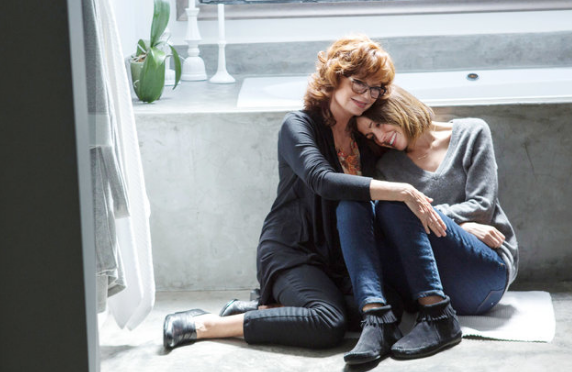There are certain expectations every mother seems to have when she has a child, be it a boy or a girl. That expectation is that the person she created will be there for her later on in life, when she needs him or her the most. In Lorene Scafaria’s (best known for Nick and Norah’s Infinite Playlist and Seeking A Friend for the End of the World) The Meddler–which may mark her shortest film title to date–Marnie Minervini (Susan Sarandon, still looking the same as ever) is just such a matriarch unable to establish the connection she wants with her daughter, Lori (Rose Byrne).
After moving to Los Angeles in the wake of her husband’s death two years prior, we’re given a diary-like account of Marnie’s day-to-day existence in the form of her leaving long, elaborate messages on Lori’s answering machine. Because of all the money Joe left to her, Marnie insists to herself and to others that she has every reason to be happy, and yet, she has overt trouble “springing” out of bed in the morning, instead looking out languidly at the sun as though wondering what she should be doing with her life. Still, her power of denial and suppression of emotion is artful in that she channels it into the focus of others, mainly Lori, who is going through a painful breakup with Jacob (Jason Ritter), an up and coming actor. Though Lori’s professional life is going well enough–she’s about to shoot a pilot in New York (a phrase that gets Marnie in trouble at the airport)–her mental state continues to be bogged down by the death of her father and the death of her long-term relationship.
Concerned for Lori’s well-being, Marnie does everything she shouldn’t–mainly, meddle–to attempt making Lori feel better. Among some of the more absurd actions is Marnie’s decision to see Lori’s therapist, Diane (Amy Landecker, one of the many goddesses of Transparent), to attempt gleaning information. But Diane only ends up revealing to Marnie just how deeply mired in grief and loneliness she is. To mask the feelings of loss she hasn’t made peace with, Marnie throws herself into every imaginable pet project while Lori is in New York, including offering $13,000 to Lori’s friend, Jillian (Cecily Strong), so that she can help plan the dream wedding she never got to have to her wife, Dani (Rebecca Drysdale). Elsewhere, Marnie also offers her services to an Apple store employee named Freddy (Jerrod Carmichael) by taking him to and from night school several days a week. She even spreads more of her time out by volunteering at the hospital, taking a special shine to an old woman who keeps making a cryptic circular gesture at her. And when she isn’t meddling into the lives of others (mind you in a positive way, in spite of the connotation of the word), she’s ambling through The Grove, L.A.’s beloved bougie outdoor mall.
But regardless of all the people she’s found to take her advice as gospel, the only person Marnie wants to listen to her is Lori. With a cricket silence in response to her barrage of messages while Lori is in New York, Lori decides to visit anyway, using the excuse of needing to see Joe’s family to discuss arrangements for his headstone–though this is truly the last thing she wants to think about. Lori dutifully allows her mother to come to the set to check out the pilot, a narrative that turns out to be heavily based on Lori’s perspective of Marnie, played by the much under utilized Laura San Giacomo. Rather than being offended by the portrayal, Marnie is more moved by the father character’s strong resemblance to Joe. Though Marnie hasn’t had any issues with attracting men in her age bracket while in Los Angeles, particularly one named Zipper (J.K. Simmons), her inability to fully move on from the memory of Joe has held her back in allowing happiness to enter her life in this way–in the form of romance.
Lori, meanwhile, has sought momentary reprieve from thinking about Jacob by sleeping with the cameraman on her show, who Marnie invites to dinner with them, where he tells her he plans to propose after only two weeks of being with her, an incongruous idea that Marnie encourages with delight. Fortunately, she has her own romantic preoccupation to distract her enough to stay out of Lori’s ultimate decision to break it off. In fact, she calls Zipper while in New York and leaves him one of her signature lengthy messages, accidentally saying “Love you” at the end as she has digressed so naturally into meddling mother mode.
Even so, her emotional pull toward reminiscing about Joe continues to get the better of her as she discusses the first time she ever made pasta for him with his trio of brothers. Upon returning to Los Angeles, she tries to quell the delight she feels after getting a response message from Zipper in which he, too, mockingly adds “Love you” at the end of it. Yet, like daughter, Marnie’s difficulty in moving forward is crippling her, and causing a significant amount of the loneliness she’s experiencing–not just because Lori doesn’t want to spend half as much time together as Marnie does.
What The Meddler seeks to say, in the end, is that the parental expectation of making a child one’s best friend after youth passes tends to result in desolation and disappointment. And for the child, the pressure to “repay” her parent for “all she’s done” (even though what she’s “done” is force you into this shit hole called the world) by succumbing to spending time with her mother only builds up resentment. Perhaps this is why Scafaria chooses to conclude the film on a note that indicates some shift has occurred in Marnie and Lori’s relationship that will make it more palatable for both. Because suffocation is never the answer.





















